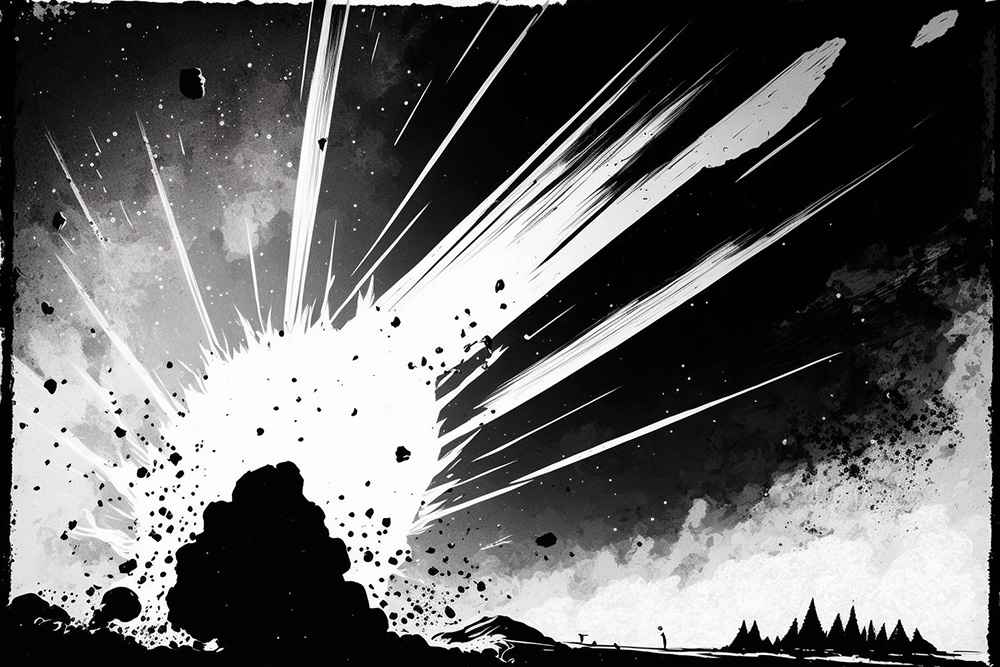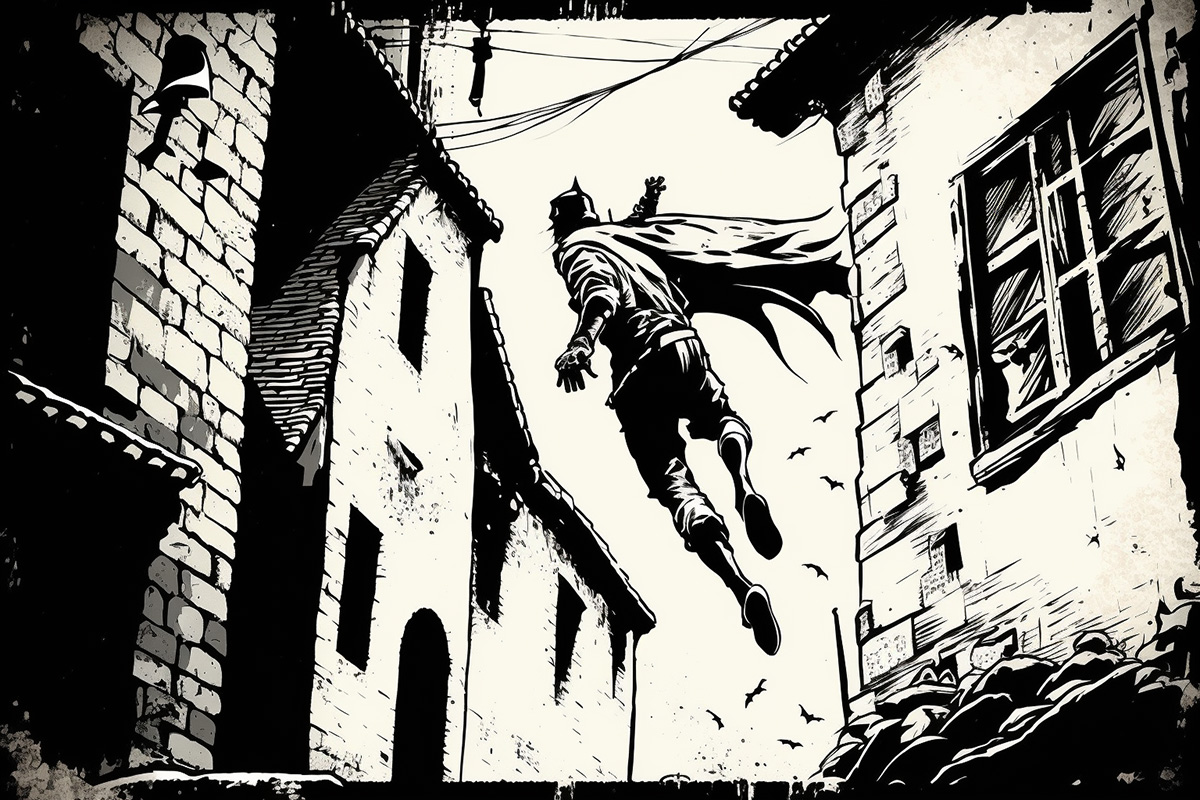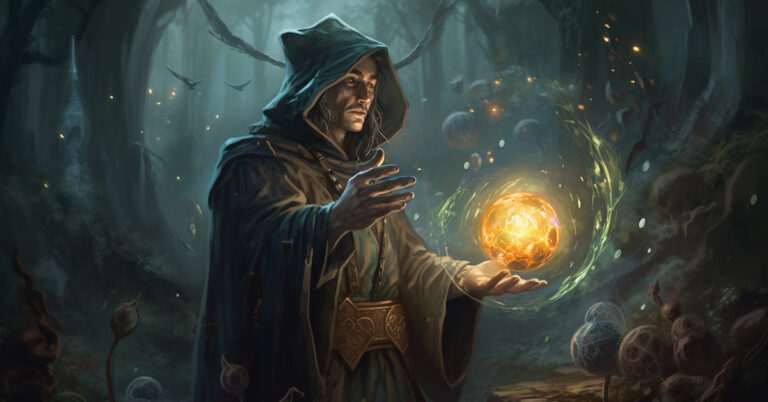Spellcasters, especially at higher levels can turn the tide of an entire battle with a single incantation, they can turn entire groups of enemies into dust or rain down destruction with a swarm of meteors. Except of course, when someone mutters, “I cast Counterspell”.
This guide will take you through the ins and outs of Counterspell, why it’s so popular, some strengths and limitations as well as a myriad of common questions, misunderstands and situations you’ll likely encounter as both a player and DM.

Table of Contents
What does Counterspell do?
Counterspell is a 3rd-level abjuration spell that allows a spellcaster to interrupt and negate the casting of another spell. When a creature within 60 feet of the caster begins casting a spell, the caster can use their reaction to attempt to counter that spell. If successful, the target’s spell is disrupted, and its effects are negated.
How does Counterspell work?
To cast Counterspell, the caster must use their reaction and expend a spell slot of 3rd level or higher. If the target is casting a spell of 3rd level or lower, the spell automatically fails and has no effect. If the target is casting a spell of 4th level or higher, the caster must make an ability check using their spellcasting ability. The DC for this check is 10 + the level of the spell being cast. If the caster succeeds, the target’s spell is countered; if not, the spell proceeds as normal.
Counterspell’s only component is somatic, meaning it can be cast without material or verbal requirements. A mere wave of your hand and you can zap the fun right out of the weave!
It is important to note that Counterspell can only be used as a reaction when a spell is being cast. If a spell has already been cast and is in effect, Counterspell cannot be used to remove it; this is where Dispel Magic comes into play.
Who can take Counterspell?
It may come as a surprise to some that Bards and even some subclasses of Rogue and Fighter can get their gauntlets on Counterspell. There’s something extra satisfying when your Eldritch Knight, locked him combat, is targetted by an enemy spellcaster who thinks they’re safe, before you Counterspell and charge towards them.
The full list of who can take Counterspell is:
- Wizards: As a class focused on versatility and knowledge of spells, it’s no surprise that wizards have access to Counterspell.
- Sorcerers: Known for their innate magical abilities, sorcerers can also learn Counterspell to disrupt the spells of their enemies.
- Warlocks: Warlocks, who draw their power from otherworldly patrons, can choose Counterspell as one of their known spells.
- Bards: As part of their diverse spellcasting repertoire, bards can access Counterspell through their Magical Secrets feature at level 6 or higher.
- Arcane Trickster Rogues and Eldritch Knight Fighters: These subclasses, which have a limited selection of spells, can choose Counterspell as one of their known spells if they meet the requirements.
Divine spellcasters such as clerics, druids, and paladins cannot access Counterspell through their spell lists.

Common Counterspell questions and confusion
With such power comes great responsibility! There are many situations that aren’t made super clear in the rules, so I’ve cobbled together some of the most common questions along with common rulings or clarified answers from the rule writers themselves!
Can I upcast Counterspell?
Yes! If you’re attempting to stop a higher-level spell, you can use one of your higher-level spell slots to cast Counterspell at a higher level. This allows you to reduce the difficulty of success checks.
Can you Counterspell without sight?
No. This often comes up, but Counterspell clearly requires the caster to see the creature casting the spell within range. If the caster cannot see the creature (due to darkness, blindness, or an obstruction), they cannot use Counterspell on that creature’s spell.
Does the target expend their spell slot if their spell is counterspelled?
Yes, if Counterspell is successful, the target loses the spell slot they were using to cast the spell. Although the rules as written (RAW) may not be super clear, this was clarified by Jeremy Crawford in 2017 (and he literally wrote the rules).
Does the Mage Slayer feat still allow an attack if the triggering spell fails due to a Counterspell?
Yes, the spellcasting has still occurred which is the trigger. This rule was clarified in 2016.
Can Subtle Spell metamagic stop Counterspell?
Yes, where the spell does not require material components. Xanathar’s Guide to Everything clarifies this on p85 in the last paragraph of the section “Perceiving a Cast at Work”, highlighting that Subtle Spell removes the somatic and verbal components from a spell. This would mean the caster would not be able to see the enemy spellcasting taking place.
Can you cast Counterspell on your reaction while casting another spell on your turn?
Yes, this is specifically covered in the example on p12 of the Sage Advice Compendium, with the example: “Cornelius the wizard is casting fireball on his turn, and his foe casts counterspell on him. Cornelius has counterspell prepared, so he uses his reaction to cast it and break his foe’s counterspell before it can stop fireball.”
Why is Counterspell so good?
Counterspell makes it onto most spellcaster’s spell lists as early as possible and for good reason:
- Control: You get to negate enemy spellcasting, it can’t be understated how powerful this can be. The ability to neutralise potentially devastating attacks and neutralise enemy support spells can make otherwise impossible encounters winnable.
- Reaction economy: Action economy rules in DnD and since Counterspell is used as a reaction, it does not consume the caster’s action or bonus action, allowing you to continue your own offensive or support actions during your turn.
- Surprise factor: Holding the Counterspell for that clutch moment can often catch opponents off guard when they are relying on a powerful spell to turn the tide of battle.
When should I cast Counterspell?
In my experience, you tend to get the most value out of Counterspell by casting it at the earliest opportunity when in combat with spellcasters. Firstly, when combat first starts, you’re more likely to be closer to the enemy spellcasters in a situation when all of your defences are intact. Secondly, and more importantly, it’s very likely that your enemy’s most powerful spells are coming right out of the gate at the start of combat. Unlike your party, which may be planning on being economical with spells for later encounters, your DM is under no such budget limitations, they are playing the encounter!
Limitations of Counterspell
Thankfully for everyone else, Counterspell does has some limitations:
- Range: Spellcasters tend to be out of the way of the fighting, meaning opposing spellcasters are sometimes a significant distance from each other, with the bloody melee sprawl happening between them. Getting yourself within 60 feet of the enemy spellcaster can be trickier than it sounds, often putting yourself in danger.
- Spell slot expenditure: While Counterspell uses a reaction, it of course also consumes a spell slot of 3rd level or higher. Your ability to limit your opponent’s spellcasting will of course, therefore, diminish your own ability to cash spells. This can be problematic during a long adventuring day.
- Uncertain outcome: When countering higher-level spells, there’s a chance the ability check will fail, resulting in you wasting both your reaction and a spell slot.
- Limited reactions: Since Counterspell uses the caster’s reaction, you will not be able to use other reactions. This means no opportunity attacks or as is popular with many Wizards, using the Shield spell to boost AC on a reaction to prevent an attack hitting.
What is the problem with Counterspell in 5e?
The main problem with Counterspell in 5e is that it can sometimes create an “arms race” between casters. When multiple spellcasters have access to Counterspell, they may engage in a continuous cycle of countering each other’s spells, making combat encounters feel repetitive or stalemated. Additionally, some players and Dungeon Masters might feel that Counterspell detracts from the excitement and unpredictability of spellcasting in combat.
Is Counterspell better than Dispel Magic?
Counterspell and Dispel Magic are both abjuration spells that deal with negating or removing magic, but they serve different purposes and have distinct mechanics.
- Timing: Counterspell is used as a reaction to interrupt a spell as it is being cast, while Dispel Magic is used as an action to remove an ongoing spell effect.
- Spell level: Counterspell is a 3rd-level spell, while Dispel Magic is a 3rd-level spell for sorcerers, warlocks, and wizards, and a 4th-level spell for bards, clerics, druids, and paladins.
- Range: Both spells have a range of 60 feet.
- Ability check: Counterspell requires an ability check to counter spells of 4th level or higher, while Dispel Magic requires a check to remove spell effects of 4th level or higher.
Counterspell is generally more effective in combat scenarios where enemy spellcasters are present, as it can prevent spells from taking effect in the first place. It’s a proactive approach to dealing with enemy magic. It’s a great spell to have prepared if you know you’re going into combat situations, especially with enemy casters.
Dispel Magic is more versatile in non-combat situations and can be useful in combat when dealing with ongoing spell effects that need to be removed. It’s a reactive approach to handling existing magical effects.
Both Counterspell and Dispel Magic have their merits and many spellcasters choose to have both spells in their arsenal to cover a wider range of magical situations.
Is Counterspell OP?
While Counterspell’s abrupt extinguishing of powerful magic can lead to debates about whether it is overpowered (OP) or not. In my opinion, it’s not as its limitations and resource expenditure help balance its power. It’s also worth keeping in mind that Counterspell’s effectiveness is also completely dependent on the presence of enemy spellcasters, with no enemy spellcasters, it is completely useless!
How do I avoid being counterspelled?
Counterspell sounds really fun until it’s the DM that is counterspelling you. Within the rules we’ve learned so far, there are numerous tactics you can use to stack the deck in your favour and reduce your risk of being at the wrong end of a Counterspell:
- Range: It’s basic, but as we’ve covered, Counterspell has a range of 60 feet. If you can keep that range, with some buffer (to take into account enemy movement), you’ll be able to cast uninterrupted.
- Cover: You have to be seen casting for the enemy to use Counterspell. If they can’t see you, they can’t counterspell you. If your environment has cover, walls, rocks, boxes, large dead things, hide behind them while casting. Don’t forget you have magical means, such as the Fog Cloud spell which has 120ft range and can block vision too.
- Subtle spell: As I mentioned earlier, if you’re a Sorcerer, you can use Subtle spell if your spell has no material component to be safe from Counterspell.
- Bait with cantrips: Assuming your DM will allow the Counterspell caster to not know what spell you’re casting, make a big show about casting that cantrip to see if you can bait the enemy into wasting their spell slots on counterspelling your cantrips.
- Reaction depletion: Trigger the enemy spellcaster’s reaction by having your party provoke an opportunity attack or remove their reaction entirely with a spell such as Shocking Grasp.
- Teamwork: Working with other ally spellcasters means you can either use up the enemy’s Counterspell with the first of your spells, or if you also have Counterspell, your ally can Counterspell the offending Counterspell for you!
- Action Surge: If you’re a multiclassed fighter, Action Surge will allow you to cast a second spell, after the enemy spellcaster has used up their Counterspell on the first spell.
- Ready: While you are behind cover or unseen, use a Ready action to prepare your spell and allow it to trigger after you move and see your target. As we specified earlier, Counterspell only stops the casting of the spell, not any effect after it has been cast.
Counterspell vs Other Spells
When the Counterspells start coming out at the table, you’ll inevitably end up in debates about how it interacts with other spells in certain situations. Here are the most common Counterspell conundrums you’re likely to face:
Does Counterspell break invisibility?
Counterspell does not directly break invisibility. However, if the caster is invisible and using the Invisibility spell, casting Counterspell would break their invisibility, as casting a spell is one of the conditions that cause the Invisibility spell to end.
Can I Counterspell with a Counterspell?
Yes, you sly dog! You can indeed use Counterspell to counter another caster’s Counterspell. This can be a strategic move to protect an important spell you are casting or to prevent an enemy from countering your ally’s spell.
Can I Counterspell a Counterspell of a Counterspell?
Okay, it’s a bit silly now, but yes, it is possible if multiple spellcasters are involved. For example, Caster A casts a spell, Caster B attempts to Counterspell it, and Caster C tries to Counterspell Caster B’s Counterspell. This can lead to a chain of Counterspells, as long as the involved spellcasters have the necessary reactions and spell slots available. It’s kind of funny the first time, less so the fifth time round.
Can Counterspell stop a cantrip?
Yes, Counterspell can be used to stop a cantrip, as cantrips are considered spells with a spell level of 0. However, do you really want to expend 3rd-level or higher spell slot to counter a cantrip? Are you really that scared of a splash of acid?
Can you Counterspell Misty Step?
Yes, Misty Step is a 2nd-level spell, and Counterspell can be used to prevent a caster from using it to teleport, and trying to do something sneaky like escaping the grapple with the barbarian in your party.
Can you Counterspell Fireball?
Yes, Fireball is a 3rd-level spell, and Counterspell can be used to prevent it from being cast. Fireball can of course be cast at higher levels, meaning you would need to succeed in a throw to Counterspell it.
Can you Counterspell Fly?
Yes, Fly is a 3rd-level spell, and Counterspell can be used to prevent a creature from gaining the ability to fly from the spell.
Can the Wish spell be Counterspelled?
Yes, the Wish spell can technically be Counterspelled, as it is a 9th-level spell. However, unless you are upcasting Counterspell, the caster attempting to Counterspell would need to make a spellcasting ability check with a DC of 19 (10 + the spell’s level) to successfully counter it. Keep in mind that successfully countering a Wish spell could have significant narrative and gameplay consequences, depending on the situation.
Does Counterspell work against wands or magic cast by items?
Yes, Counterspell targets a creature casting a spell, no matter the source of the spell. Following the previous rules, most DMs would likely rule that the item also loses a magic charge as the spell failed – but make sure to check with them, especially when it comes to scrolls!

Should I take Counterspell?
To put it bluntly, “yes”. Normally, when I’m writing about DnD spells and we come to this question, I’ll give a balanced answer that usually talks about the aspects of fun, roleplaying, and your function within the party and the campaign. However, in this case, I’m simply going to lump with a simple, “yes”.
Even a high-level party’s day out adventuring can be ruined by a powerful enemy spellcaster. Your raging barbarian pal may seem unstoppable while she’s dodging orc spears and kneecapping frost giants, but she’ll likely be near defenceless when it comes to magical attacks – which is where you can come in and save the day.
When should I take Counterspell?
Third levels spells are when spellcasters really start packing a punch, but many of them will drop off in effectiveness as you level up – this isn’t true of Counterspell, it just gets better! Playing as a Wizard, I would add Counterspell to your spell book at the earliest possible opportunity, leaving the challenge (as is always the way playing a Wizard), as just deciding when you should have it prepared.
If you’re playing a Sorcerer, you’ll have the option to switch out spells as you level up, so I would recommend initially picking other spells when you hit level 5 to get the most out of them and then switch them out later so you can learn Counterspell.
Go forth and Counterspell
While you should now be prepared to both spoil a fellow spellcaster’s day and avoid having your own day soiled by the evaporation of magic when you most need it, it’s worth checking in with your DM to clarify their interpretation of the rules and how they will handle any of the above scenarios. Remember, the DM has the final say in your game and there’s no Counterspelling them, just good communication to avoid disappointment!
